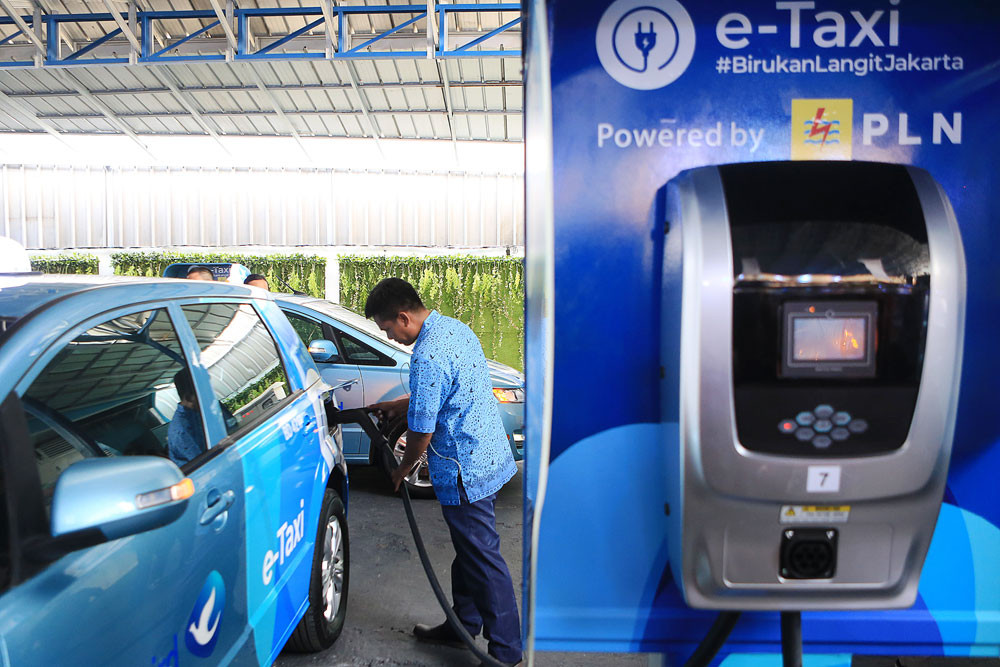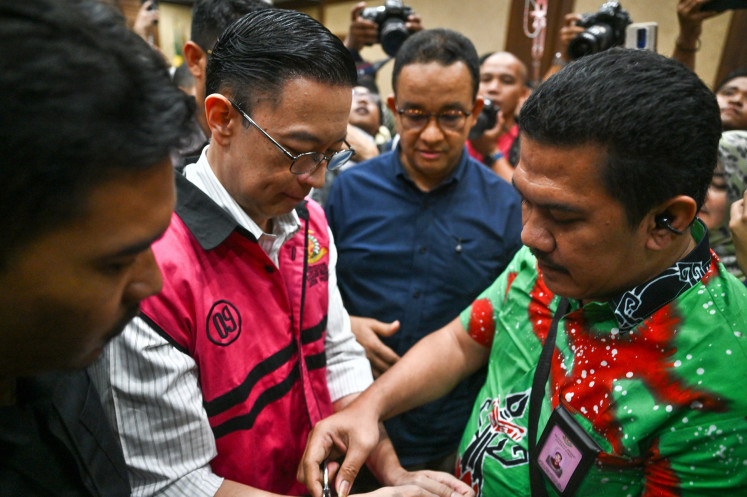Popular Reads
Top Results
Can't find what you're looking for?
View all search resultsPopular Reads
Top Results
Can't find what you're looking for?
View all search resultsGojek, Grab, Bluebird lead way for EV adoption in Indonesia
By replacing part of their fleets with electric vehicles, ride-hailing and taxi companies may create the critical mass in charging station demand to trigger widescale EV use in Indonesia
Change text size
Gift Premium Articles
to Anyone
P
rivate-sector transportation companies have announced plans to put on the roads thousands of electric vehicles (EV), which could propel EV adoption in Indonesia by creating demand for a network of charging stations.
Management consulting firm McKinsey & Company senior expert Rahul Gupta said ride-hailing, taxi and feet services touched two of three factors that would boost EV adoption in Indonesia, namely higher consumer awareness and demand, as well as a decline in total cost of ownership (TCO).
“Firstly, they account for a significant number of vehicles running on the road, and there is a pull from consumers to adopt EV. Secondly, given the high average daily distance that ride-hailing and taxi drivers run, it helps improve the TCO competitiveness with internal combustion engine [ICE] vehicles, thus supporting the business case,” he told The Jakarta Post on Wednesday.
Gupta went on to say that, if companies collected data on their drivers’ journeys, that would make it easy for charging operators to decide on the location of fast charging or battery swap stations.
“Charging operators can optimize the inventory for battery swap stations, which is one of the biggest cost items,” he added.
Taxi provider Blue Bird and ride-hailing companies Gojek and Grab have all taken steps to roll out EV with trial runs as well as partnerships with EV manufacturers to provide electric motorbikes and cars for their drivers.
Homegrown ride-hailing company Gojek announced on Tuesday a partnership with Taiwan-based EV manufacturer Gogoro for a trial involving 250 electric two-wheelers and battery swap services from Gogoro at four gas stations in Jakarta.
Through the partnership, which marks its second EV trial, Gojek plans to deploy 5,000 electric motorcycles, starting with 500 vehicles in South Jakarta. In an announcement in May, the ride-hailing company vowed to make its entire fleet electric and become a carbon-neutral company by 2030.
Read also: Gojek to deploy 5,000 e-motorbikes in second EV trial
Singapore-based Grab, meanwhile, which has also announced a net-zero emissions commitment, recently placed an order for 6,000 electric motorbikes from local manufacturer Viar Motor Indonesia. The company plans to distribute the vehicles to drivers throughout Indonesia by the end of this year.
Grab also launched an electric taxi service, Grab Car Electric, in 2019. Grab Indonesia managing director Neneng Goenadi told the Post on Thursday that the company planned to have 26,000 EVs for its delivery partners by 2025.
Similarly, taxi company Blue Bird launched 30 electric cars in 2019 and has since set a target to operate 2,000 EV cars by 2025. The company operated 16,963 regular taxis in 2020. It also has limousines, rental cars, buses and shuttle buses adding up to more than 5,000 vehicles.
The government has proclaimed a target to have 400,000 electric four-wheelers and 1.76 million electric two-wheelers on the road by 2025. That seems a tall order, given that Indonesia had only 150 electric four-wheelers, 5,538 two-wheelers and 29 three-wheelers on the road as of September, according to Industry Ministry maritime industry, transportation and defense equipment director Sony Sulaksono.
Read also: Indonesia 'still far' from EV adoption target: Ministry official
State-owned electricity company PLN predicted that Indonesia would need more than 31,000 charging stations by 2030, requiring investment estimated at Rp 54.6 trillion (US$3.8 billion).
PLN technology vice president Zainal Arifin said the utility company had 50 general-purpose electric charging stations (SPLU) in operation across 18 cities as of October and planned to set up 67 more by the end of the year.
The company projected that Indonesia would have 168 charging stations at the turn of the year, with numerous built by the private sector.
“I think there is a lot of interest in installing more charging stations, but the EV [fleet] is still small, so companies are waiting for the right momentum,” he told the Post in a phone call on Wednesday.
Zainal went on to say that private sector initiatives for EV use would boost adoption across all market segments.
“Aside from private ownership, we expect EVs to come from [taxi firms] and ride-hailing [companies]. Government officials’ cars will also be replaced with electric ones starting next year,” he said.










